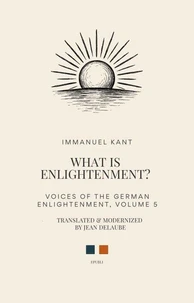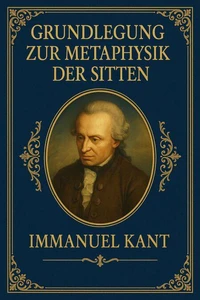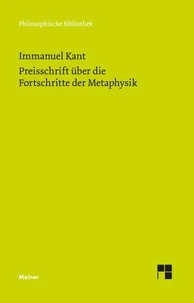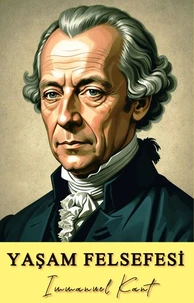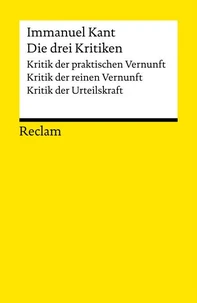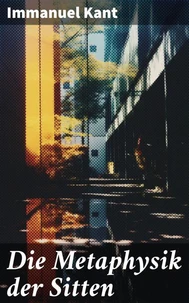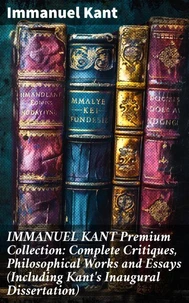The Kantian Ethics: Metaphysics of Morals, The Critique of Practical Reason & Perpetual Peace. Exploring the Moral Foundations of Reason and Autonomy
Par : , ,Formats :
Disponible dans votre compte client Decitre ou Furet du Nord dès validation de votre commande. Le format ePub est :
- Compatible avec une lecture sur My Vivlio (smartphone, tablette, ordinateur)
- Compatible avec une lecture sur liseuses Vivlio
- Pour les liseuses autres que Vivlio, vous devez utiliser le logiciel Adobe Digital Edition. Non compatible avec la lecture sur les liseuses Kindle, Remarkable et Sony
 , qui est-ce ?
, qui est-ce ?Notre partenaire de plateforme de lecture numérique où vous retrouverez l'ensemble de vos ebooks gratuitement
Pour en savoir plus sur nos ebooks, consultez notre aide en ligne ici
- Nombre de pages805
- FormatePub
- ISBN859-65--4768026-0
- EAN8596547680260
- Date de parution28/11/2023
- Protection num.Digital Watermarking
- Taille1 Mo
- Infos supplémentairesepub
- ÉditeurGOOD PRESS
Résumé
Immanuel Kant'Äôs "The Kantian Ethics: Metaphysics of Morals, The Critique of Practical Reason & Perpetual Peace" intricately weaves together the foundational principles of his moral philosophy. Kant's works present a rigorous exploration of normative ethics grounded in the notions of duty and the categorical imperative, prompting readers to consider moral law as inherently universal and absolute.
Through meticulous argumentation, he critiques prior ethical systems, establishing a unique moral framework that fosters autonomy and rationality, while also envisioning a path to everlasting peace through moral governance in international relations, as articulated in "Perpetual Peace." Kant, a luminary of the Enlightenment and a pivotal figure in modern philosophy, was profoundly influenced by the tumultuous sociopolitical landscape of 18th-century Europe.
His background in rationalist and empiricist traditions informed his critical approach, enabling him to challenge prevailing ethical doctrines and articulate a novel conception of moral obligation. His commitment to reason, autonomy, and universal ethics mirrors his lifelong pursuit of knowledge and enlightenment, often reflecting on the human condition and society's moral progress. This compilation is essential for scholars and students of philosophy, as it not only elucidates Kant's ethico-political theories but also inspires contemporary ethical discourse.
Readers seeking a transformative understanding of moral reasoning are encouraged to engage with Kant's profound insights, which remain relevant in navigating ethical dilemmas today.
Through meticulous argumentation, he critiques prior ethical systems, establishing a unique moral framework that fosters autonomy and rationality, while also envisioning a path to everlasting peace through moral governance in international relations, as articulated in "Perpetual Peace." Kant, a luminary of the Enlightenment and a pivotal figure in modern philosophy, was profoundly influenced by the tumultuous sociopolitical landscape of 18th-century Europe.
His background in rationalist and empiricist traditions informed his critical approach, enabling him to challenge prevailing ethical doctrines and articulate a novel conception of moral obligation. His commitment to reason, autonomy, and universal ethics mirrors his lifelong pursuit of knowledge and enlightenment, often reflecting on the human condition and society's moral progress. This compilation is essential for scholars and students of philosophy, as it not only elucidates Kant's ethico-political theories but also inspires contemporary ethical discourse.
Readers seeking a transformative understanding of moral reasoning are encouraged to engage with Kant's profound insights, which remain relevant in navigating ethical dilemmas today.
Immanuel Kant'Äôs "The Kantian Ethics: Metaphysics of Morals, The Critique of Practical Reason & Perpetual Peace" intricately weaves together the foundational principles of his moral philosophy. Kant's works present a rigorous exploration of normative ethics grounded in the notions of duty and the categorical imperative, prompting readers to consider moral law as inherently universal and absolute.
Through meticulous argumentation, he critiques prior ethical systems, establishing a unique moral framework that fosters autonomy and rationality, while also envisioning a path to everlasting peace through moral governance in international relations, as articulated in "Perpetual Peace." Kant, a luminary of the Enlightenment and a pivotal figure in modern philosophy, was profoundly influenced by the tumultuous sociopolitical landscape of 18th-century Europe.
His background in rationalist and empiricist traditions informed his critical approach, enabling him to challenge prevailing ethical doctrines and articulate a novel conception of moral obligation. His commitment to reason, autonomy, and universal ethics mirrors his lifelong pursuit of knowledge and enlightenment, often reflecting on the human condition and society's moral progress. This compilation is essential for scholars and students of philosophy, as it not only elucidates Kant's ethico-political theories but also inspires contemporary ethical discourse.
Readers seeking a transformative understanding of moral reasoning are encouraged to engage with Kant's profound insights, which remain relevant in navigating ethical dilemmas today.
Through meticulous argumentation, he critiques prior ethical systems, establishing a unique moral framework that fosters autonomy and rationality, while also envisioning a path to everlasting peace through moral governance in international relations, as articulated in "Perpetual Peace." Kant, a luminary of the Enlightenment and a pivotal figure in modern philosophy, was profoundly influenced by the tumultuous sociopolitical landscape of 18th-century Europe.
His background in rationalist and empiricist traditions informed his critical approach, enabling him to challenge prevailing ethical doctrines and articulate a novel conception of moral obligation. His commitment to reason, autonomy, and universal ethics mirrors his lifelong pursuit of knowledge and enlightenment, often reflecting on the human condition and society's moral progress. This compilation is essential for scholars and students of philosophy, as it not only elucidates Kant's ethico-political theories but also inspires contemporary ethical discourse.
Readers seeking a transformative understanding of moral reasoning are encouraged to engage with Kant's profound insights, which remain relevant in navigating ethical dilemmas today.


